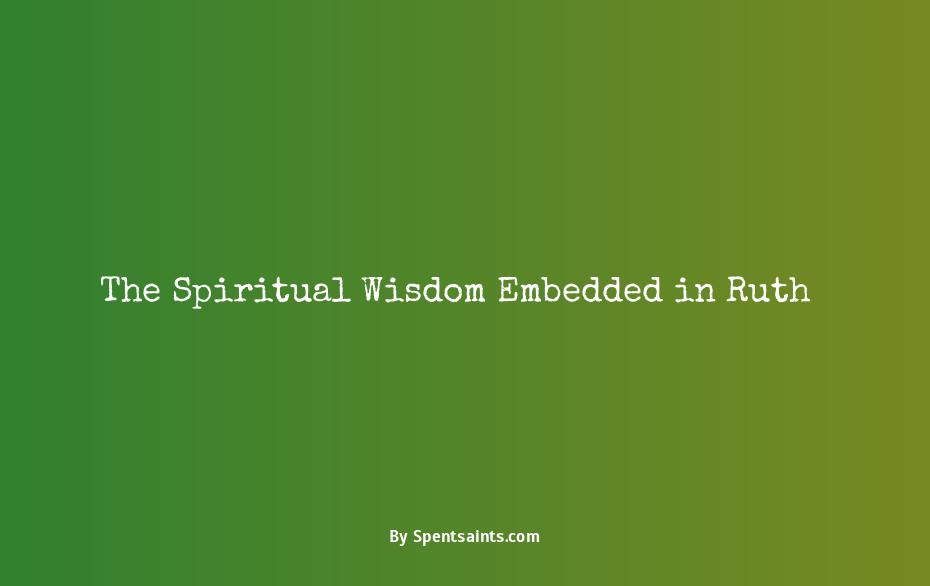The story of Ruth in the Bible contains profound spiritual meaning that resonates deeply today. In just four compact chapters, her narrative conveys timeless lessons about devotion, kindness, faith and redemption that enrich inner life.
As we probe the virtues Ruth embodies more closely, we uncover potent and transformative spiritual wisdom for applying in everyday growth and adversity.
Ruth’s selflessness reflects core spiritual values
Ruth’s sacrificial love, as shown through persevering service to Naomi, models foundational spiritual virtues. She surrenders personal comforts and security to care for her bereaved, impoverished mother-in-law in a foreign land. This reflects Ruth’s selflessness and duty placed above individual wants – values at the heart of spiritual devotion.
Her story reveals that the spiritual path often requires forsaking the familiar to walk alongside others in hardship. Ruth’s unconditional loyalty emphasizes compassionate bonds beyond circumstance. Her example calls us to cast off social barriers or convenience to meet suffering with empathy, priority attention and hope.
Committed through all trials
Ruth’s bold pledge, “Where you go I will go…” (Ruth 1:16) contains a profound lesson in steadfast love and solidarity. By binding her future completely to Naomi’s, despite destitution as a widow in Judah, Ruth models spiritual commitment reaching beyond emotional or social limits. She conveys a loyalty as relentless as God’s loving kindness pursuing humanity.
The grace that Ruth and Naomi extend towards one another, though exiled and grieving, also radiates spiritual strength. Their dignity clinging together through trauma, retaining gratitude amid wreckage, reinforces that spiritual transformation often germinates in life’s toughest storms.
Defying divisions between people
Ruth bears courage as an outsider. As a Moabite woman, she crosses ethnic and religious barriers to support Naomi. Her stirring vow culminates in the iconic lines, “Where you die I will die and be buried” (Ruth 1:17), pledging to share even a gravesite. This loyalty spanning deep cultural divides contains symbolic spiritual meaning about the power of human bonds beyond labels.
Ruth models viewing people according to shared essence rather than social constructs. Her story conveys that spiritual connections should transcend such divisions. It calls us to dismantle prejudice, privilege walls that exclude outcasts, foreigners or minorities deemed lesser. Instead, like Ruth, we can lead with bold love that washes over human separation.
Divine orchestration despite Ruth’s deep tragedies
Ruth suffers crushing loss as trauma plagues her family. First famine rips their household from Judah to Moab, then premature death takes both husband and sons – Ruth’s past and future. She chooses precarious duty to Naomi though it promises further poverty, obscurity and grief in a foreign land that bears her little goodwill.
Yet amid cascading setbacks, God choreographs redemption. Despite bereavement leaving Ruth a marginalized widow and childless in old age, her fierce faithfulness becomes a channel of blessing. Her story traces improbable favor as loyalty lifts Ruth from beseeching scraps to restart Naomi’s family lineage, becoming King David’s ancestor.
Faith shining amid adversity’s shadows
Ruth clashes hope against circumstance through tenacious initiative and reliance in crisis. She refuses victimhood, instead gathering vital food, pursuing work and appealing for family restoration by ancient custom. Her pursuit of survival sparkles with savvy courage.
Ruth leans wholly on spiritual sources of sustenance when earthly means fall short, guided by her sovereign Shepherd through the shadowy valley. Her boldness – whether gleaning or laying at feet on threshing floors – proclaims a faith daring to trust God’s purpose despite threatening terrain. Ruth models deep reliance on spiritual power to transform barrenness into bounty.
Outsider symbolizing true righteousness
As a destitute Moabite clinging to Naomi, Ruth becomes a double outsider in Judah – excluded by gender, poverty and ethnicity from social blessings. Yet though she lacks the entitlements tied to Israelite heritage, Ruth models genuine righteousness lacking even amid God’s covenant people.
So this loyal woman, treated as a pariah, develops symbolic spiritual importance. Her character purity as a stranger highlights waywardness amid those bound to Law and Temple. Ruth signals the failure of empty ritual religion, foreshadowing spiritual renewal found beyond human divisions or pride in status.
How to apply Ruth’s story for spiritual growth today
For contemporary spiritual nourishment, Ruth still personifies loving virtues like mercy, hope and moral courage today. Her treatment of Naomi models the timeless essence of “love your neighbor as yourself” (Leviticus 19:18).
Beyond exemplifying compassion, Ruth also summons purposeful living despite uncertainty. She rouses us to walk in solidarity with excluded ones, overcoming fear or complacency to demonstrate selfless spiritual care.
Cultivating spiritual empathy & redemption of divisions
Ruth models empathy by living fully among those considered foreign or subordinate. She acts with dignity upon Naomi, devoid of any sense of social privilege or deservedness. Her story beckons us to mirror this servant-heart by binding across human divisions to ease others’ sorrow.
It urges demolishing walls that exclude people deemed lesser or flawed. Ruth’s legacy speaks louder than entitlement, beckoning spiritual redemption where we sacrifice superiority to meet oppressed ones eye-to-eye. Her pledge across separation inspires remedy through shared shelter.
Despite crushed communal pasts, Ruth assists in pioneering an inclusive spiritual path. She illuminates potential for former strangers to interweave stories into tapestries of unity. Ruth empowers us to help restore human dignity fragmented by indifference or oppression when we prize compassion over labels.
We also see our shadows in Naomi’s bitter bereavement that spurns enduring hope. Her very name “Pleasant” warped into “Bitter”, she seeks refuge among ruins past Moab towards Judah. Often trauma and despair like Naomi’s cloud spiritual sight. We also may resign the possibility of restoration or divine purpose after devastation.
Ruth accompanies and gently guides her disoriented mother-in-law towards spiritual harbor after they have lost everything familiar. She becomes Naomi’s shepherd through the darkest valley back towards community and kinsman that redeem their destitution. Ruth models that spiritual friendship offer fellowship guiding each other home.

Dreams, spirit, growth – I explore them all. Laugh, learn, grow with me. Unlock your inner guru.
